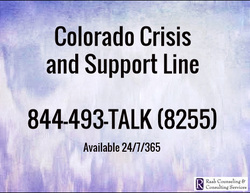 844-493-TALK (8255) 844-493-TALK (8255) On August 12, 2014, the Colorado Crisis and Support Line opened its doors. This new statewide crisis hotline is open to anyone in Colorado who needs emergency mental health assistance or is seeking extra support. All callers can expect to speak to a trained mental health professional. Phones are answered 24 hours a day, 365 days a year. The crisis line phone number is 844-493-TALK (8255) You do not need to live in Denver to use the hotline! It is available to EVERYONE in Colorado! The crisis line advocates can assist callers with a variety of personal and mental health emergencies. Here are a few reasons you might call the hotline:
Please, if you need immediate assistance with a life-or-death situation, call 911 or go to your nearest emergency room. The hotline is run by the Colorado Department of Human Services (CDHS) and Metro Crisis Services. Click here to read the CDHS press release on the opening of the crisis line. Bethany Raab is a Licensed Clinical Social Worker in Denver, Colorado.
Welcome back to my blog series in honor of May being designated Mental Health Awareness Month. If you haven't already, you can click below to read parts one and two. Please read and share with your network to help spread awareness about mental illness and mental health care! Mental Health Awareness Month: Myths and Facts, Part 1 Mental Health Awareness Month: Myths and Facts, Part 2 Myth #4: Mental health treatment does not work. Fact: Mental health treatment does work and it can help you! Research is being done around the world on various types of therapy. This research is important, especially because it has given us what are called “evidenced base models” of therapy. What this means is that valid, scientific research proves that certain kinds of therapy do work! Several models used by therapists around the United States are evidenced based and widely used. These include but are not limited to: Acceptance and Commitment Therapy (ACT), Cognitive Behavioral Therapy (CBT), Dialectical Behavior Therapy (DBT), and Eye Movement Desensitization and Reprocessing (EMDR). Do not hesitate to ask a potential therapist about what models of therapy they use in their practice and whether or not it is evidenced based. You can click on any of the models listed above to learn more. Click here to view a guide about evidenced based models. Of course, it is possible for you to see a great therapist who does evidenced based work and not see much benefit. The key to therapy being helpful is not only having a skilled and trusted therapist but YOU! I once heard this in a training presented by my colleague Brenda Bomgardner: There are 168 hours in a week. If you spend 1 of those hours in therapy and the other 167 hours ignoring or forgetting what you learned, therapy may not be very effective. Therapy can be hard. Therapy asks a lot of the client, but it is worth it! Myth #5: If I go to therapy, I will have to take medication. Fact: Many mental health problems can be successfully treated with only therapy. Some mental illnesses are best treated with a combination of medication AND therapy. It is important to note that most therapists cannot prescribe medication, as most of us do not have medical training. Therapists who are trained as social workers, counselors, or psychologists are not allowed to give medical advice as it is out of our area of expertise. If you begin therapy, a counselor or therapist might recommend you see a doctor to consider medication. If this happens and you choose to follow the recommendation, you will need to schedule an appointment with a medical doctor. Some general practitioners may be willing to prescribe medications for certain mental health reasons. You may also prefer or need to see a psychiatrist, depending on your individual situation. These professionals are medical doctors who are specifically trained to provide medication and, sometimes, therapy to care for mental illnesses. Your therapist and your doctor will work together with you to determine which path is best for you and your needs. Here is my next challenge to you: Do a quick online search of therapists in your area. See who is out there and take a look at the models of therapy they provide. Choose one to learn more about and take time to read at least one article. It is good to be informed! Check back tomorrow for a bonus post on self-care! Bethany Raab is a Licensed Clinical Social Worker in Denver, Colorado.
|
Welcome!
Every blog post you see on this page is written especially for teens and their parents! Like it? Pin it!
Follow me!
Categories
All
|

 RSS Feed
RSS Feed